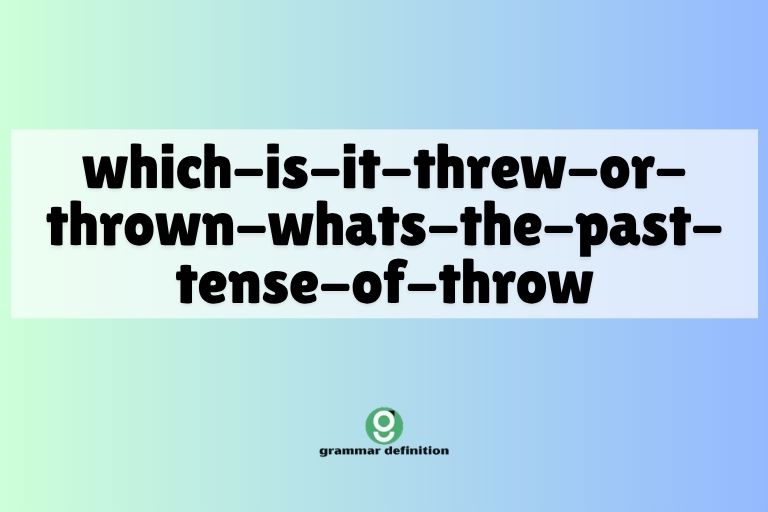What’s the Plural of Basis? A Comprehensive Guide

Understanding how to form plurals correctly is a fundamental aspect of English grammar. While most nouns follow simple pluralization rules, some, especially those of foreign origin, can be tricky.
One such word is “basis.” Knowing its plural form and how to use it correctly is crucial for clear and accurate communication. This article provides a comprehensive guide to the plural of “basis,” exploring its definition, usage, common mistakes, and more.
Whether you’re a student, a writer, or simply looking to improve your English, this guide will equip you with the knowledge you need.
Table of Contents
- Introduction
- Definition of Basis
- Structural Breakdown
- Types or Categories of Basis
- Examples of Basis and Bases
- Usage Rules
- Common Mistakes
- Practice Exercises
- Advanced Topics
- FAQ
- Conclusion
Definition of Basis
The word “basis” is a noun that refers to the underlying support, foundation, or essential ingredient. It’s the fundamental principle or groundwork upon which something else is established or developed.
In simpler terms, it’s what something relies on or starts from. The term originates from the Greek word “basis,” meaning “pedestal” or “that on which one stands.” It has been integrated into the English language and is commonly used in various contexts, from scientific research to everyday conversations.
Understanding the definition is crucial because it helps clarify the contexts in which “basis” and its plural form, “bases,” are appropriately used. For instance, a scientific study might be conducted on the *basis* of previous research, or a legal argument might have several *bases* for its claims.
Classification of Basis
Grammatically, “basis” is classified as a singular, common noun. It is a countable noun, meaning it can be counted individually.
This is important to note because it directly influences how we form its plural and use it in sentences. Countable nouns have distinct singular and plural forms, unlike uncountable nouns (e.g., water, air), which typically do not.
Function of Basis
The primary function of “basis” in a sentence is to act as a noun. It can serve as the subject, object, or complement of a verb, or the object of a preposition.
Its role is to identify the foundation or support that something else is built upon. For example:
- Subject: The basis of his argument was flawed.
- Object: They questioned the basis of the decision.
- Object of a preposition: She made her decision on the basis of the evidence.
Contexts of Use
“Basis” is used in a wide array of contexts, including:
- Science: The experimental data provides the basis for the theory.
- Law: There was no legal basis for the claim.
- Mathematics: A set of vectors that form a basis for a vector space.
- Finance: Investment decisions should be made on a sound basis.
- Everyday Language: Our friendship is built on a basis of trust.
Structural Breakdown
The plural of “basis” is “bases.” This pluralization follows a specific pattern that is common with nouns ending in “-is.” Understanding this pattern can help you correctly pluralize other similar words. The rule is that nouns ending in “-is” often change their ending to “-es” in the plural.
The change from “basis” to “bases” involves altering the vowel sound and adding the “-es” suffix. This change is rooted in the word’s Greek origin and its subsequent adaptation into English.
It’s important to recognize that this isn’t a standard English pluralization rule; rather, it’s a pattern borrowed from classical languages.
Root Word Derivation
The word “basis” comes directly from the Greek word “basis,” which means “foundation” or “base.” The plural form in Greek would follow similar rules, influencing the English adoption. Recognizing this origin helps explain why the pluralization deviates from typical English patterns.
Suffix Change “-is” to “-es”
The key to forming the plural of “basis” is understanding the suffix change. The “-is” ending transforms into “-es.” This pattern is observed in other words of Greek origin, such as “analysis” (plural: “analyses”) and “crisis” (plural: “crises”).
This consistent pattern can serve as a mnemonic device to aid in remembering the correct pluralization.
Pronunciation of “Bases”
The pronunciation of “bases” is /ˈbeɪsiːz/. Note the change in the vowel sound from the singular form.
This pronunciation is important to ensure clear communication. While the spelling is crucial, the correct pronunciation solidifies understanding and avoids confusion.
Types or Categories of Basis
While “basis” itself doesn’t have different ‘types’ in the same way that verbs or adjectives might, we can categorize its usage based on the context in which it appears. Different fields of study or areas of life might use “basis” in slightly different ways, although the core meaning remains consistent.
Scientific Basis
In scientific research, “basis” often refers to the underlying principles or experimental evidence that supports a theory or hypothesis. It’s the foundation upon which scientific knowledge is built.
A strong scientific basis is crucial for the validity and acceptance of any scientific claim.
Legal Basis
In law, “basis” refers to the legal justification or foundation for a claim, argument, or decision. A legal claim must have a solid legal basis to be successful in court.
This could be a statute, a precedent, or a constitutional principle.
Mathematical Basis
In mathematics, “basis” has a specific meaning in linear algebra. It refers to a set of linearly independent vectors that span a vector space.
This mathematical “basis” is a fundamental concept in understanding vector spaces and linear transformations. It provides a framework for representing any vector within that space.
Ethical Basis
In ethics, “basis” refers to the underlying moral principles or values that guide behavior and decision-making. An ethical framework provides a basis for judging actions as right or wrong.
This is crucial in fields like medicine, business, and politics.
Logical Basis
In logic and reasoning, “basis” refers to the fundamental assumptions or premises upon which an argument is built. A strong argument needs a sound logical basis to be persuasive.
This involves ensuring that the premises are true and that the reasoning is valid.
Examples of Basis and Bases
Understanding the usage of “basis” and “bases” is best achieved through examples. The following tables provide comprehensive examples in various contexts to illustrate the correct usage of both the singular and plural forms.
The table below shows examples of the singular form, “basis,” used in sentences. Notice how it always refers to a single foundational element or principle.
Singular Form: Basis
| Sentence | Context |
|---|---|
| The decision was made on the basis of the evidence presented. | Legal/General |
| What is the basis for your argument? | General/Debate |
| The theory has a strong scientific basis. | Scientific |
| Our friendship is built on a basis of mutual respect. | Personal/Social |
| There is no basis for these allegations. | Legal/Journalistic |
| The company operates on the basis of sustainable practices. | Business/Environmental |
| The course provides a solid basis for further study. | Educational |
| His conclusion lacked a factual basis. | Academic |
| The artist’s work has a philosophical basis. | Art/Intellectual |
| The research project started with a clear theoretical basis. | Research |
| The new law has a constitutional basis. | Legal/Political |
| Her confidence had a firm basis in her abilities. | Personal |
| The investment strategy is based on one fundamental basis: long-term growth. | Financial |
| The doctor determined the diagnosis on the basis of several tests. | Medical |
| The design of the building had an architectural basis in modernism. | Architectural |
| The team’s success had a solid basis in collaborative work. | Team Work |
| The teacher graded the students on the basis of their performance. | Educational |
| The lawyer challenged the claim on the basis of insufficient evidence. | Legal |
| The organization was founded on the basis of helping the needy. | Philanthropic |
| The project was approved on the basis of its environmental impact assessment. | Environmental |
| The treaty formed the basis for future cooperation between the two nations. | Political |
| The agreement was reached on the basis of mutual understanding. | Negotiations |
| The scientific debate centered on the basis of the new discovery. | Scientific |
| The moral framework provides a basis for ethical decision-making. | Ethical |
| The logical argument had a flawed basis, making it invalid. | Logical |
| The economic model has a mathematical basis in statistical analysis. | Economic |
| The artistic movement had a cultural basis in historical events. | Cultural |
| The technological innovation had a research basis in experimental science. | Technological |
The table below illustrates the plural form, “bases,” used in sentences. Here, “bases” refers to multiple foundations, reasons, or supporting elements.
Plural Form: Bases
| Sentence | Context |
|---|---|
| The argument has several bases. | General/Debate |
| The company has bases in several countries. | Business/Geographical |
| There were no bases for their accusations. | Legal |
| The sculpture was supported by three concrete bases. | Art/Construction |
| The scientific theory rests on multiple experimental bases. | Scientific |
| The legal challenge was dismissed because it lacked factual bases. | Legal |
| The team developed several strategic bases to achieve their goals. | Strategic |
| The negotiations failed due to conflicting ethical bases. | Ethical |
| The mathematician used several mathematical bases to solve the equation. | Mathematical |
| The philosophical discussion explored various logical bases. | Philosophical |
| The economic policy had multiple economic bases. | Economic |
| The cultural movement had several historical bases. | Cultural |
| The technological advancement stands on several research bases. | Technological |
| The political campaign was constructed on several social bases. | Political |
| The architectural design had several artistic bases. | Architectural |
| The educational curriculum was designed with several theoretical bases. | Educational |
| The historical analysis was grounded on several documentary bases. | Historical |
| The environmental project relied on multiple ecological bases. | Environmental |
| The health program was built on several scientific bases. | Medical |
| The investment portfolio was diversified across several financial bases. | Financial |
| The company expanded its operations to several international bases. | International Business |
| The athletic team used several training bases to improve performance. | Sports |
| The space mission had several logistical bases to ensure success. | Space Exploration |
| The humanitarian effort was supported by multiple funding bases. | Humanitarian |
| The software development had several programming bases. | Software Development |
| The artistic installation was constructed with several creative bases. | Artistic |
| The psychological study used several experimental bases to draw conclusions. | Psychological |
This table presents comparative examples, showing how both “basis” and “bases” can be used in similar sentences to convey different meanings based on whether a single foundation or multiple foundations are being referenced.
Comparative Examples: Basis vs. Bases
| Singular (Basis) | Plural (Bases) |
|---|---|
| The decision was made on the basis of one key piece of evidence. | The decision was made on the bases of several pieces of evidence. |
| The argument has a strong basis in historical fact. | The argument has several bases in historical, economic, and social factors. |
| The theory has a scientific basis. | The theory has multiple scientific bases, supported by various experiments. |
| Our agreement has a basis in mutual trust. | Our agreement has bases in shared values and mutual benefits. |
| There is no basis for the claim. | There are no bases for the numerous claims. |
| The structure has a solid foundation and good design basis. | The structure is standing on several structural bases. |
| His confidence had a firm basis in his abilities. | His confidence had firm bases in his past achievements and current skills. |
| The new approach is based on the basis of years of research. | The new approach is based on the bases of years of research and practical experiences. |
| The judge made the call on one basis. | The judge made the call on several bases. |
| The new building has it’s basis in modern architecture. | The new building has it’s bases in the design of the past and future. |
| The band had its basis in California. | The band had its bases in California, New York, and Texas. |
| The plan had its basis in the last quarter’s success. | The plan had its bases in the last three quarter’s successes. |
| The show had a basis in reality. | The show had it’s bases in reality, fiction, and history. |
| The game had its basis in a board game. | The game had its bases in a board game, cards, and imagination. |
| The event had its basis in charity. | The event had its bases in charity, fun, and community. |
| The course had its basis in the teacher’s knowledge. | The course had its bases in the teacher’s knowledge, books, and the internet. |
| The group had its basis in the local community. | The group had its bases in the local community, online, and world-wide. |
| The business had it’s basis in hard work. | The business had it’s bases in hard work, planning, and luck. |
| The relationship had it’s basis in love. | The relationship had it’s bases in love, trust, and friendship. |
| The success had it’s basis in determination. | The success had it’s bases in determination, skill, and practice. |
Usage Rules
The primary rule for using “basis” and “bases” is to ensure that the singular form is used when referring to a single foundation or reason, and the plural form is used when referring to multiple foundations or reasons. This aligns with the general rule of singular and plural nouns in English.
Singular “Basis” Rule
Use “basis” when referring to a single foundation, reason, or underlying principle. It indicates a single point of support or origin.
The singular form is appropriate when you are talking about one specific element that something relies upon.
Plural “Bases” Rule
Use “bases” when referring to multiple foundations, reasons, or underlying principles. It indicates multiple points of support or origin.
The plural form is appropriate when you are talking about several distinct elements that something relies upon.
Prepositional Phrases with “Basis”
“Basis” is commonly used in prepositional phrases, such as “on the basis of,” “as a basis for,” and “without a basis in.” These phrases require careful attention to whether the context calls for the singular or plural form.
- On the basis of: This phrase is used to indicate the reason or justification for something. “The decision was made on the basis of the evidence.” (Singular) / “The decision was made on the bases of several factors.” (Plural)
- As a basis for: This phrase indicates that something serves as a foundation for something else. “This research serves as a basis for future studies.” (Singular) / “These findings serve as bases for developing new strategies.” (Plural)
- Without a basis in: This phrase indicates that something lacks a foundation or justification. “The accusations were made without a basis in fact.” (Singular) / “The accusations were made without bases in any credible evidence.” (Plural)
Formal vs. Informal Usage
The use of “basis” and “bases” remains consistent in both formal and informal contexts. There are no specific variations in how these words are used based on the level of formality.
The key is to ensure grammatical correctness regardless of the setting.
Common Mistakes
One of the most common mistakes is using “basis” when the plural form “bases” is required, or vice versa. This often happens due to a lack of awareness of the correct pluralization rule or a misunderstanding of the context.
Another common mistake is confusing “basis” with similar-sounding words like “base.” While “base” can sometimes be used in a similar context, it has a broader range of meanings and isn’t always interchangeable with “basis.”
Here are some examples of common mistakes and their corrections:
| Incorrect | Correct | Explanation |
|---|---|---|
| The argument has several basis. | The argument has several bases. | “Basis” is singular; “bases” is required for plural. |
| The theory has multiple scientific basis. | The theory has multiple scientific bases. | “Basis” is singular; “bases” is required for plural. |
| The decision was made on the bases of the evidence. | The decision was made on the basis of the evidence. | “Basis” is required when referring to a single set of evidence. |
| The project had it’s base in hard work. | The project had it’s basis in hard work. | “Basis” is the correct word to use in this context. |
| What is the bases of your argument? | What is the basis of your argument? | “Basis” is needed to describe the one thing your argument relies on. |
| The structure rests on multiple physical basis. | The structure rests on multiple physical bases. | “Bases” is correct because it refers to many things. |
| She made her choice on the basis of several reasons. | She made her choice on the bases of several reasons. | “Bases” is needed to indicate multiple reasons. |
| The team had it’s base in hard work, skill, and hope. | The team had it’s bases in hard work, skill, and hope. | “Bases” is needed to describe the many things the team had. |
Practice Exercises
Test your understanding of “basis” and “bases” with these practice exercises. Fill in the blanks with the correct form of the word.
Exercise 1: Fill in the Blanks
| Question | Answer |
|---|---|
| 1. The judge made the ruling on the ______ of the law. | basis |
| 2. The company has operational ______ in three different countries. | bases |
| 3. What is the ______ for your claim that the product is defective? | basis |
| 4. The scientific theory rests on several experimental ______. | bases |
| 5. The argument lacked a factual ______. | basis |
| 6. The study was built on the ______ of previous research. | basis |
| 7. There were no valid ______ for their accusations. | bases |
| 8. The sculpture was supported by concrete ______. | bases |
| 9. The ethical framework provides a ______ for decision-making. | basis |
| 10. The logical argument had several flawed ______. | bases |
Exercise 2: Correct the Sentence
Correct the following sentences if they contain an error in the use of “basis” or “bases.”
| Question | Answer |
|---|---|
| 1. The argument has several basis. | The argument has several bases. |
| 2. The decision was made on the bases of the evidence. | The decision was made on the basis of the evidence. |
| 3. The theory has multiple scientific basis. | The theory has multiple scientific bases. |
| 4. Our friendship is built on a bases of mutual respect. | Our friendship is built on a basis of mutual respect. |
| 5. There is no bases for these allegations. | There are no bases for these allegations. |
| 6. The conclusion lacked two factual basis. | The conclusion lacked two factual bases. |
| 7. The artist’s work has several philosophical basis. | The artist’s work has several philosophical bases. |
| 8. The research project started with a clear theoretical bases. | The research project started with a clear theoretical basis. |
| 9. The new law has a constitutional bases. | The new law has a constitutional basis. |
| 10. Her confidence had a firm bases in her abilities. | Her confidence had a firm basis in her abilities. |
Exercise 3: Multiple Choice
Choose the correct word (“basis” or “bases”) to complete each sentence.
| Question | Options | Answer |
|---|---|---|
| 1. The decision was made on the _____ of the available information. | (a) basis (b) bases | (a) basis |
| 2. The company established several strategic _____ in key markets. | (a) basis (b) bases | (b) bases |
| 3. What is the _____ for your argument? | (a) basis (b) bases | (a) basis |
| 4. The scientific theory rests on multiple experimental _____. | (a) basis (b) bases | (b) bases |
| 5. The accusations were made without any factual _____. | (a) basis (b) bases | (a) basis |
| 6. The foundation laid a strong _____ for future research. | (a) basis (b) bases | (a) basis |
| 7. The team developed multiple _____ for their strategies. | (a) basis (b) bases | (b) bases |
| 8. Her conclusion had a solid _____ in reality. | (a) basis (b) bases | (a) basis |
| 9. The negotiations broke down due to conflicting ethical _____. | (a) basis (b) bases | (b) bases |
| 10. The mathematician used several _____ to solve the problem. | (a) basis (b) bases | (b) bases |
Advanced Topics
For advanced learners, it’s helpful to understand the nuances of how “basis” and “bases” are used in more complex contexts. This includes exploring their usage in academic writing, technical fields, and idiomatic expressions.
Usage in Academic Writing
In academic writing, “basis” and “bases” often appear in research papers, dissertations, and scholarly articles. It’s crucial to use these words precisely to convey the foundation or justification for arguments, theories, and findings.
Pay close attention to the context to ensure you are using the correct form.
Technical Fields
In technical fields like science, engineering, and mathematics, “basis” may have specific technical meanings. For example, in linear algebra, a “basis” is a set of linearly independent vectors that span a vector space.
Understanding these technical definitions is essential for accurate communication within these fields.
Idiomatic Expressions
While “basis” is not commonly used in many idiomatic expressions, it’s worth noting that some phrases might use it in a figurative sense. Understanding these expressions requires familiarity with their specific meanings and contexts.
For example, “touch base” (though using “base,” not “basis”) is a common idiom meaning to make contact or communicate briefly.
FAQ
Here are some frequently asked questions about the plural of “basis.”
- What is the plural of “basis”?
The plural of “basis” is “bases.” This follows a pattern common in words of Greek origin, where the “-is” ending changes to “-es” in the plural form.
- How do I know when to use “basis” vs. “bases”?
Use “basis” when referring to a single foundation, reason, or principle. Use “bases” when referring to multiple foundations, reasons, or principles. Consider the context of the sentence to determine whether you are referring to one or more elements.
- Is “basis” a countable or uncountable noun?
“Basis” is a countable noun. This means it has both singular (“basis”) and plural (“bases”) forms, and it can be counted individually.
- Can I use “base” instead of “basis”?
While “base” and “basis” share a similar meaning related to foundations, they are not always interchangeable. “Basis” specifically refers to the underlying support or justification, while “base” has a broader range of meanings. Use “basis” when you specifically mean the fundamental reason or principle.
- Why does “basis” have an irregular plural form?
The irregular plural form of “basis” (“bases”) is due to its Greek origin. Many words borrowed from Greek and Latin retain their original pluralization patterns.
- Are there other words that follow the same pluralization rule as “basis”?
Yes, several other words of Greek origin follow the same pluralization rule, such as “analysis” (plural: “analyses”), “crisis” (plural: “crises”), “hypothesis” (plural: “hypotheses”), and “thesis” (plural: “theses”).
- Is it correct to say “on what basis” or “on what bases”?
The correct phrase depends on the context. If you are asking about a single reason or justification, use “on what basis.” If you are asking about multiple reasons or justifications, use “on what bases.” For example: “On what basis did you make that decision?” (single reason) vs. “On what bases are you claiming discrimination?” (multiple reasons).
- What is the pronunciation of “bases”?
The pronunciation of “bases” is /ˈbeɪsiːz/.
Conclusion
Mastering the pluralization of “basis” to “bases” is a crucial step in refining your English grammar skills. By understanding the word’s definition, origin, and usage rules, you can confidently use it in various contexts.
Remember to consider the context to determine whether you are referring to a single foundation or multiple foundations. Practice identifying the correct form in sentences and be aware of common mistakes to avoid errors in your writing and speech.
With these tools, you’ll be well-equipped to use “basis” and “bases” accurately and effectively.






